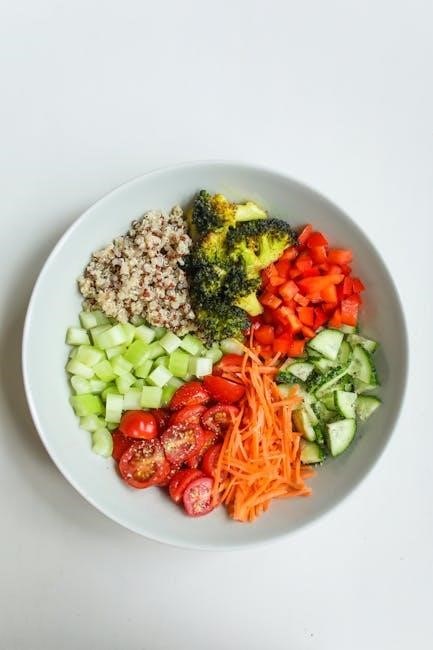Understanding PCOS and Its Impact on Nutrition
Polycystic Ovary Syndrome (PCOS) is a hormonal disorder affecting women‚ often linked to insulin resistance. A tailored diet helps manage symptoms like weight gain and hormonal imbalances.
Insulin Resistance and Its Role in PCOS

Insulin resistance is a key factor in PCOS‚ leading to high insulin levels and blood sugar imbalances. It often causes symptoms like fatigue‚ weight gain‚ and sugar cravings. Managing insulin resistance through diet is crucial to improving PCOS symptoms. Focus on low-glycemic foods‚ fiber-rich options‚ and healthy fats to stabilize blood sugar and enhance insulin sensitivity. Avoid refined carbohydrates and processed foods that exacerbate insulin spikes. By addressing insulin resistance‚ women with PCOS can better regulate their hormones‚ improve energy levels‚ and support overall metabolic health. A well-designed meal plan plays a vital role in overcoming these challenges and promoting long-term wellness.
The Importance of a Balanced Diet for PCOS Management

A balanced diet is essential for managing PCOS symptoms‚ as it helps regulate blood sugar‚ improve insulin sensitivity‚ and support hormonal balance. Eating whole‚ unprocessed foods like vegetables‚ lean proteins‚ and whole grains provides necessary nutrients while minimizing inflammation. A well-structured diet can also aid in weight management‚ which is critical for many women with PCOS. Additionally‚ incorporating anti-inflammatory foods and healthy fats supports overall health and fertility. By focusing on nutrient-dense meals‚ women with PCOS can better control their symptoms and improve their quality of life. A tailored meal plan ensures a consistent and effective approach to managing the condition through dietary changes.

Benefits of a PCOS Meal Plan
A PCOS meal plan helps manage symptoms‚ improve insulin sensitivity‚ promote weight loss‚ and enhance fertility through structured‚ balanced nutrition.
Weight Management and Weight Loss
Weight management is crucial for women with PCOS‚ as excess weight exacerbates insulin resistance and hormonal imbalances. A structured PCOS meal plan focuses on balanced macronutrients‚ whole foods‚ and portion control to promote sustainable weight loss. By prioritizing protein‚ healthy fats‚ and fiber-rich carbohydrates‚ the plan helps stabilize blood sugar levels and reduce cravings. Regular‚ nutrient-dense meals support metabolism and energy levels‚ making it easier to maintain a healthy weight. While weight loss can be gradual with PCOS‚ even a small reduction improves metabolic health and hormonal balance. Consistency and patience are key‚ as this approach fosters long-term lifestyle changes rather than quick fixes.
Improving Fertility and Hormonal Balance
Diet plays a pivotal role in managing PCOS-related hormonal imbalances and enhancing fertility. By focusing on nutrient-dense foods‚ women can regulate insulin levels‚ which directly impacts hormone production. Incorporating whole grains‚ lean proteins‚ and healthy fats helps stabilize blood sugar and promote hormonal equilibrium. Anti-inflammatory foods‚ such as leafy greens and berries‚ reduce inflammation that can disrupt ovarian function. Omega-3 rich foods‚ like fatty fish‚ further support hormonal health. A structured PCOS meal plan encourages balanced eating‚ which can improve menstrual regularity and fertility outcomes. By addressing insulin resistance and inflammation through diet‚ women with PCOS can better regulate their hormones and enhance their reproductive health.

Key Components of a PCOS-Friendly Diet
- Whole‚ unprocessed foods to stabilize blood sugar and improve insulin sensitivity.
- Anti-inflammatory foods like berries and leafy greens to reduce inflammation.
- Healthy fats for hormone balance and satiety.
Focus on Whole‚ Unprocessed Foods
Eating whole‚ unprocessed foods is essential for managing PCOS. These foods‚ such as vegetables‚ fruits‚ whole grains‚ lean proteins‚ and healthy fats‚ help stabilize blood sugar and improve insulin sensitivity. They are rich in fiber‚ vitamins‚ and minerals‚ which support overall health and reduce inflammation. Avoiding refined carbohydrates and sugary snacks helps prevent insulin spikes‚ a common issue in PCOS. Incorporating these foods into your diet promotes weight management‚ enhances hormonal balance‚ and alleviates symptoms like fatigue and bloating. Whole foods also provide sustained energy and satiety‚ making them a cornerstone of a PCOS-friendly meal plan.
Incorporating Anti-Inflammatory Foods

Incorporating anti-inflammatory foods into your PCOS diet is crucial for reducing inflammation‚ a key contributor to PCOS symptoms. Foods like berries‚ leafy greens‚ and fatty fish (rich in omega-3s) help lower inflammation and improve hormonal balance. Turmeric‚ ginger‚ and olive oil also have potent anti-inflammatory properties. These foods support weight management‚ improve insulin sensitivity‚ and alleviate conditions like bloating and fatigue. By emphasizing whole‚ nutrient-dense options‚ you can create a diet that not only combats inflammation but also promotes overall well-being and symptom relief for PCOS. Regularly including these foods in your meal plan can lead to noticeable improvements in energy levels and hormonal stability.

Sample 7-Day PCOS Meal Plan
A 7-day PCOS meal plan provides structured breakfast‚ lunch‚ and dinner ideas‚ promoting balanced nutrition and symptom relief. Each day includes recipes like veggie frittatas‚ grilled salmon‚ and avocado toast‚ ensuring variety and flavor while managing PCOS symptoms effectively.
Breakfast‚ Lunch‚ and Dinner Ideas
Start your day with a veggie frittata and whole-grain toast or avocado toast topped with poached eggs. For lunch‚ opt for a chicken and vegetable stir-fry with brown rice or a hearty salad with rotisserie chicken. Dinner ideas include grilled salmon with steamed broccoli‚ zucchini noodles with turkey meat sauce‚ or tacos made with lean ground turkey. These meals focus on whole‚ unprocessed foods‚ lean proteins‚ and fiber-rich vegetables to help stabilize blood sugar and improve PCOS symptoms. Incorporate anti-inflammatory foods like avocado‚ berries‚ and olive oil to enhance the nutritional benefits of each meal. Portion control and variety ensure balanced nutrition throughout the day.
Snack Options and Beverage Choices
Healthy snacks and beverages are crucial for managing PCOS symptoms. Opt for nutrient-dense options like avocado slices‚ fresh berries‚ or a handful of nuts. Veggies with hummus or a small portion of Greek yogurt with honey are great choices. For beverages‚ prioritize water‚ herbal teas‚ or green tea to stay hydrated and reduce inflammation. Avoid sugary drinks like soda or juice. Incorporate anti-inflammatory beverages like turmeric latte or cucumber lime water for added benefits. These snacks and drinks help stabilize blood sugar‚ reduce cravings‚ and support overall hormonal balance. Choose options rich in fiber and protein to keep you satisfied between meals.
Customizing Your PCOS Meal Plan
Tailor your meal plan to suit your preferences‚ dietary restrictions‚ and lifestyle. Adjust portion sizes and incorporate feedback to ensure the plan is effective and sustainable for you.
Adjusting for Dietary Restrictions
Accommodate dietary preferences by substituting ingredients in your PCOS meal plan. For gluten-free diets‚ opt for whole grains like quinoa or brown rice. Dairy-free alternatives include almond milk or coconut yogurt. Vegetarian options can replace meats with plant-based proteins like beans or tofu. If following a low-FODMAP diet‚ choose low-FODMAP vegetables and avoid high-FODMAP foods. Incorporate gluten-free flours for baking needs. Ensure substitutions maintain nutritional balance and flavor. These adjustments allow you to enjoy delicious‚ PCOS-friendly meals while adhering to your dietary needs. Consistency in meal planning is key to managing symptoms effectively. Personalize your plan to suit your lifestyle and preferences for long-term success.
Personalizing Portion Sizes
Portion control is essential for managing PCOS symptoms like weight and insulin levels. Start by measuring food portions using a scale or measuring cups to ensure accuracy. Adjust serving sizes based on your caloric needs‚ activity level‚ and weight goals. For example‚ opt for smaller portions of calorie-dense foods and larger portions of vegetables. Consistency is key to observing how your body responds to different portion sizes. Over time‚ fine-tune your portions to maintain a healthy weight and improve hormonal balance. Personalizing portions ensures you meet nutritional needs without overeating‚ making your PCOS meal plan more effective and sustainable.

FAQs About PCOS Meal Plans
FAQs about PCOS meal plans address common concerns‚ such as customization options‚ accessibility of free PDF guides‚ and the effectiveness of the plans in managing symptoms.
Can I Customize the Meal Plan?
Yes‚ you can customize the meal plan based on your preferences and dietary needs. Adjust recipes‚ portion sizes‚ and ingredients to suit your lifestyle and restrictions. Personalization ensures sustainability and satisfaction‚ making the plan more effective for managing PCOS symptoms. Free PDF guides often include flexible options and tips for modifications‚ allowing you to tailor meals without compromising nutritional benefits. This adaptability helps maintain consistency and makes the journey towards better health more enjoyable and achievable. Customizing your meal plan ensures it fits seamlessly into your daily life‚ promoting long-term success in managing PCOS through diet.

How Do I Access the Free PDF?
To access the free PDF‚ visit the website offering the PCOS meal plan and click on the download link provided. Many resources offer a free 7-day or 21-day PCOS meal plan PDF‚ complete with recipes and grocery lists. Simply enter your email or click the download button to get instant access. Ensure the source is reputable to avoid unnecessary sign-ups. The PDF is designed to be user-friendly‚ with printable recipes and meal plans tailored for PCOS management. Downloading it allows you to plan and prepare meals conveniently‚ helping you stay consistent with your dietary goals. It’s a quick and easy way to start your journey toward better health.

Additional Resources for PCOS Management
Explore free downloadable guides and expert advice to support your PCOS journey. These resources offer practical tips‚ recipes‚ and community support to help manage symptoms effectively.
Free Downloadable Guides and Recipes
Access free PDF guides offering detailed meal plans and recipes tailored for PCOS management. These resources provide structured 7-day or 21-day plans‚ complete with shopping lists and easy-to-follow instructions.
Support Communities and Expert Advice
Join online communities and forums to connect with others managing PCOS. These platforms offer emotional support and practical tips for navigating diet and lifestyle changes. Additionally‚ expert advice from registered dietitians and endocrinologists provides personalized guidance tailored to your needs. Engaging with these resources can empower you to make informed decisions and stay motivated on your health journey.



